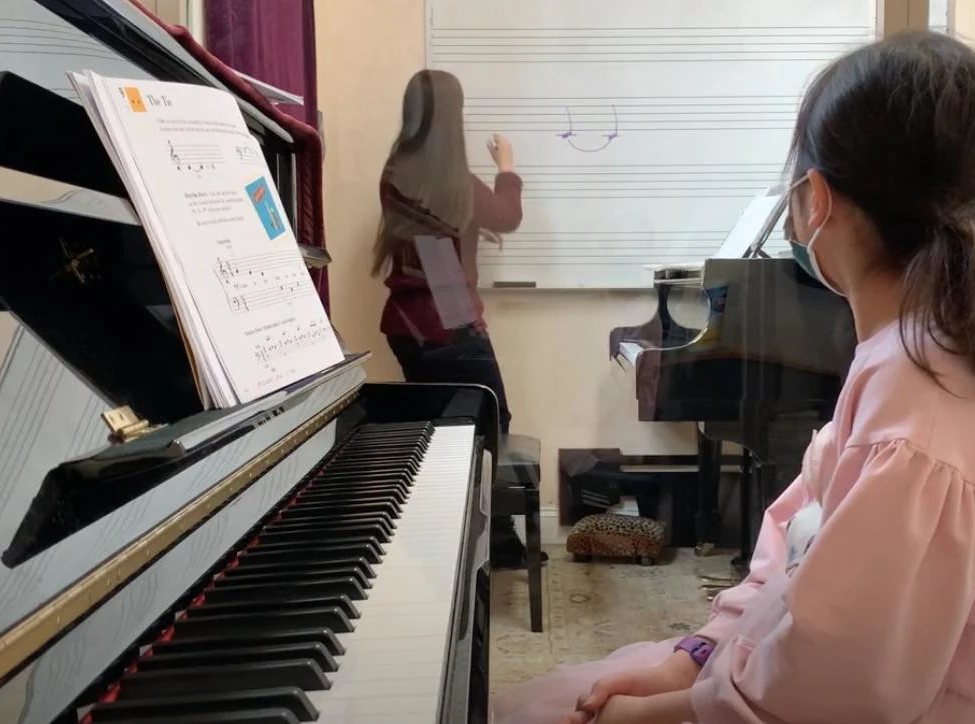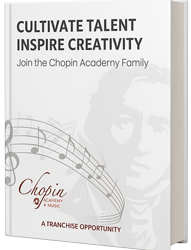Are you passionate about music and looking to start a business? Do you dream of running an education-based venture and enriching the lives of your students? If so, a music school franchise could strike just the right chord. For entrepreneurs wondering how to start a music school franchise, choosing a franchise model provides pre-established brand recognition, a proven curriculum, and operational support–all key factors that drive enrollment and maintain retention.
This guide explores how to start a music school franchise, how these business models work, their average startup costs, operational considerations, and the advantages of franchising over independent ownership. Whether you’re an entrepreneur, musician, investor, or some combination of all three, this article will help you more fully understand the concept and benefits of music school franchising.
How A Music School Franchise Works
A music school franchise operates as part of an established brand, providing standardized music education programs to students of many ages and skill levels. Those who invest in a music school franchise can enjoy such benefits as:
- An established business model – The franchisor has spent the time to optimize its operations, marketing efforts, and curriculum.
- Brand recognition – Established names, such as the Chopin Academy of Music, can attract parents and students more easily than unknown independent schools.
- Training and support – Franchisors often provide onboarding, teacher training, and ongoing assistance, as well as continual systems refinement.
- Marketing and enrollment strategies – Many franchises offer technological tools, local advertising support, and student enrollment systems.
Franchisees typically pay an initial franchise fee, ongoing royalties (i.e. a percentage of revenue), and marketing fees. In return, they gain access to proprietary teaching methods, software, brand credibility, and other invaluable resources.
Music School Startup Costs: What to Expect
If you’re researching the costs to start a music education franchise, this section will help you understand the typical investment range and financial requirements involved.

Opening a music school franchise requires an initial investment, which varies depending on the brand, location, and facility size. For entrepreneurs exploring how to invest in a music franchise, it’s essential to understand these upfront costs clearly before moving forward. Depending on the size and type of music school franchise you’re opening, equipment costs, instrument fees, acoustic/sound dampening panels, specialized tools, and other investment expenses can also play into your overall cost.
Franchise fees typically rest in the $20K – $75K range, while total investment can be anywhere from the low $200Ks to nearly one million dollars. Various additional financial requirements will likely be in place for investors as well, including personal net worth minimums, liquid capital availability, and high FICO scores.
Discover the inspiring story behind Chopin Academy of Music and why it’s a top music school franchise opportunitySome franchises offer home-based or studio-sharing models, reducing overhead costs. Others require standalone locations with dedicated lesson rooms. Knowing how to invest in a music franchise wisely often means choosing the model that aligns with your budget, long-term goals, and target market. When it comes to music school franchises, there are many different models and particularities to keep in mind, so study carefully.
How to Run a Successful Music Franchise
Operational Considerations
Running a music school franchise involves several key operational elements to keep in mind:
Steps to Open a Music Franchise
For entrepreneurs ready to dive in, here are the essential steps to open a music franchise:
- Research and compare franchise brands.
- Evaluate startup costs and funding options.
- Choose a location or model (home-based, studio-sharing, or standalone).
- Secure franchisor approval and complete training.
- Hire qualified instructors and set up your curriculum.
- Launch marketing and enrollment campaigns.
These steps ensure a smoother process and set the foundation for long-term success.
Location & Facility
- High foot traffic areas can generate interest from folks walking by
- Standalone buildings offer more space and flexibility in school layout
- Shared spaces reduce costs but may limit operations and lesson scheduling significantly
Hiring & Training Instructors
- Franchisors often provide training programs for teachers, but they are also typically required to have serious music bonafides as a foundation for success
- Ideal instructors are both skilled musicians and effective educators
- Part-time teachers can help manage fluctuating student schedules
Curriculum & Teaching Methods
- Many franchises provide standardized lesson plans, ensuring brand consistency
- Some use proprietary methods and programs that are unique to their business or franchise
- Group classes and private lessons each have different requirements and applications
Student Acquisition & Retention
- Leveraging the franchisor’s brand and digital tools (SEO, social media, local ads) can help to market effectively in your area
- As a generally referral-heavy business, satisfied parents and students can bring in new enrollments
- Recitals, rewards programs, and progress tracking keep students and parents engaged, leading to higher retention rates
Franchising vs. Do It Yourself: Which Is Better?
To contrast the difference between franchising a music school and independently starting one, Let’s start by looking at the DIY route. For one, starting from scratch means building up a reputation, creating a curriculum that you can actually sell to people, and a great deal of learning about operating this type of business through trial and error. While being a sole owner with some potentially lower upfront costs can be a nice sell, the amount of variables at play will likely give most would-be business owners serious pause.
Discover how to turn your passion for music into a profitable business with a proven franchise modelOn the other hand, investing in a music school franchise carries with it a number of benefits that can dismantle many of those hurdles. Benefitting from a recognized brand with a proven curriculum, an investment in a franchise can buy you instant trust with your intended demographic, encouraging high interest and strong student retention. Additionally, support from the franchisor can work to alleviate some of the stresses of running a business, affording you more time to adequately oversee day-to-day operations. Choosing the best music school to buy also means taking into consideration a franchise’s national recognition and history of participation in high-level music events (concerts, competitions, recitals, etc.), which can go even further to bolster your presence.
Ultimately, the choice to franchise goes the furthest toward efficiently and effectively educating as many up-and-coming players as possible. With faster ramp-up times, potentially reduced risk, scalability potential, creative freedom, and lower ongoing costs, investors in music school franchises can make their money go a long way toward enriching and beautifying their communities, all while increasing music franchise profitability.
Making A Deeper Impact
Compared to other education franchises like tutoring, STEM, or preschools, music schools offer recurring revenue via ongoing lessons with students who often (and ideally) study for multiple years. What’s more, the community and personal impacts of a high-quality music school franchise are significant, encouraging increased interest in the arts and an active engagement with music.
With many parents prioritizing structured, high-quality programs, music education franchises offer the perfect blend of organization, proven methods, and creativity, enriching the lives of students and generating healthy returns for investors.




